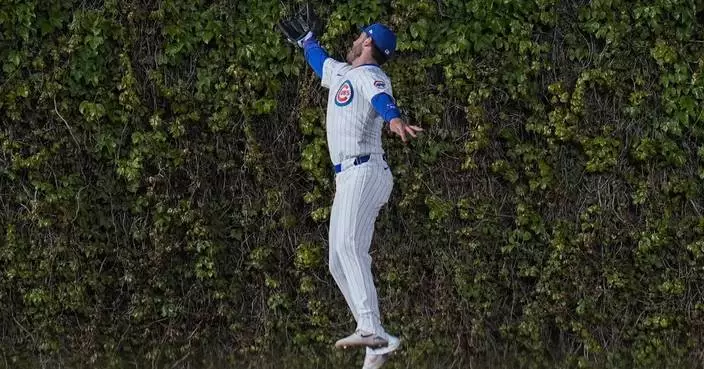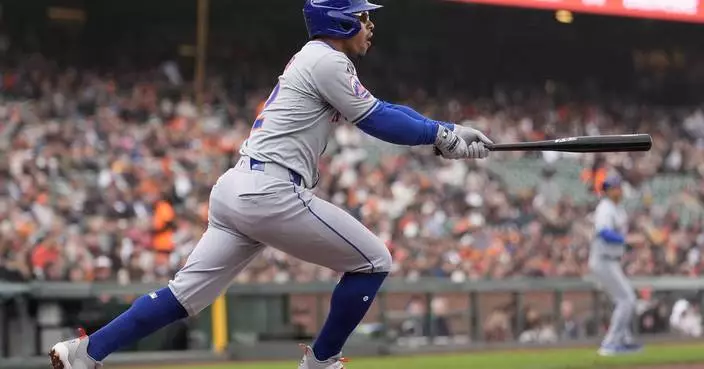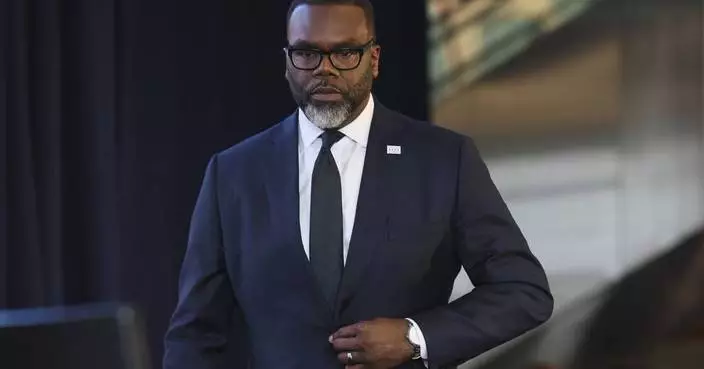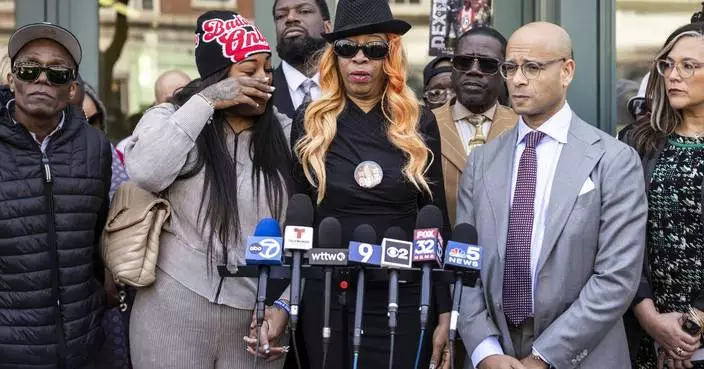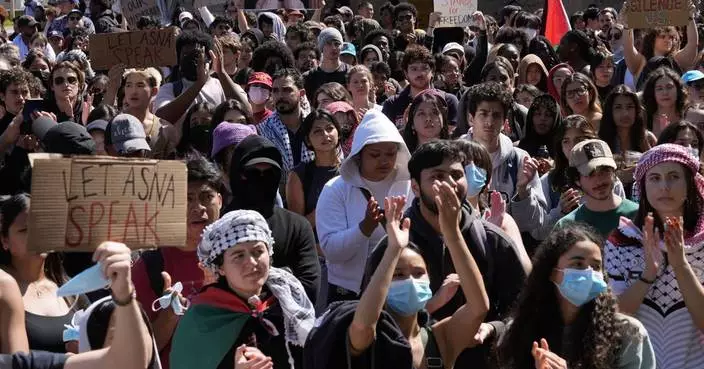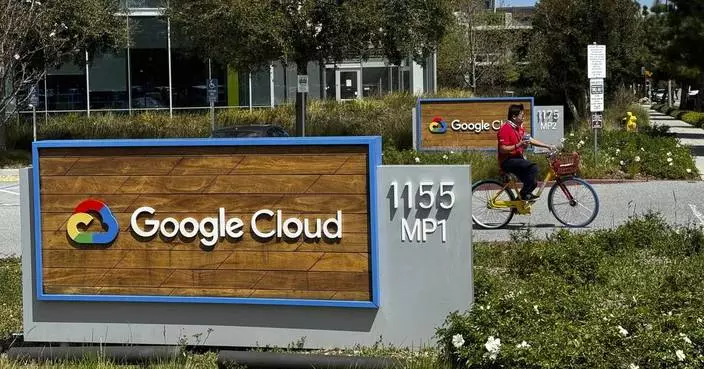Thousands of anti-violence protesters marched along a Chicago interstate on Saturday, shutting down traffic to draw attention to the gun violence that's claimed hundreds of lives in some of the city's poorest neighborhoods and pressure public officials to do more to stop it.
Marchers chanted, "Stop the killing," and carried signs reading, "We need jobs," and other messages. Some stopped to scrawl on the road with chalk: "Enough is enough" and "Peace." Toward the front of the march the Rev. Michael Pfleger, a Roman Catholic priest on the city's South Side who organized the protest; Chicago police Supt. Eddie Johnson; and the Rev. Jesse Jackson linked arms.
Click to Gallery
Thousands of anti-violence protesters marched along a Chicago interstate on Saturday, shutting down traffic to draw attention to the gun violence that's claimed hundreds of lives in some of the city's poorest neighborhoods and pressure public officials to do more to stop it.
"The people won today because the people showed up. They saw this many people out here, black and white and brown and young and old, and saying, 'We're tired of the damn violence in Chicago,'" Pfleger said after completing the roughly 1.5-mile (2.4 kilometer) route.
The march took place along the northbound lanes of Interstate 94, known as the Dan Ryan Expressway, after a roughly hourlong standoff between police and the protesters. The expressway was fully reopened less than 90 minutes later, after the protest ended.
Illinois State Police, which has jurisdiction over expressways, announced around 11:30 a.m. that they were shutting down all northbound lanes of the expressway. Protesters then began walking northbound along the route.
"I am calling on the Mayor to take swift and decisive action to put an end to this kind of chaos," Rauner wrote.
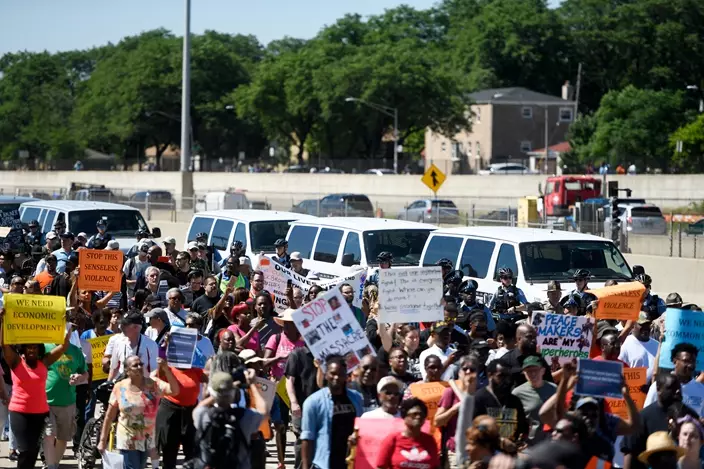
Protesters march on the Dan Ryan Expressway, Saturday, July 7, 2018, in Chicago. The protesters shut down the expressway to draw attention to the city's gun violence and pressure public officials to do more to help neighborhoods hardest hit by it.(AP Photo/Annie Rice)
"The people won today because the people showed up. They saw this many people out here, black and white and brown and young and old, and saying, 'We're tired of the damn violence in Chicago,'" Pfleger said after completing the roughly 1.5-mile (2.4 kilometer) route.
"We want the governor, the mayor, the elected officials and the community all to come together and say, 'We want peace now.'"
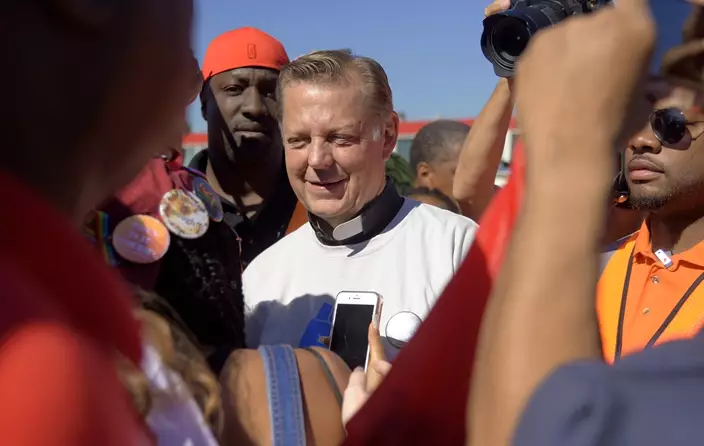
The Rev. Michael Pfleger speaks to protesters before marching on the Dan Ryan Expressway, Saturday, July 7, 2018, in Chicago. The protesters shut down the expressway to draw attention to the city's gun violence and pressure public officials to do more to help neighborhoods hardest hit by it.(AP Photo/Annie Rice)
The march took place along the northbound lanes of Interstate 94, known as the Dan Ryan Expressway, after a roughly hourlong standoff between police and the protesters. The expressway was fully reopened less than 90 minutes later, after the protest ended.
Illinois State Police, which had warned earlier in the week that any pedestrian entering the expressway would face arrest, said early Saturday that an agreement had been reached for protesters to march on a portion of the roadway. Officers and vehicles lined up, forming a barrier to keep protesters in two northbound lanes, allowing some traffic to pass in other northbound lanes.
But Pfleger and protesters insisted there was no agreement and that they would shut down the entire northbound roadway, with Pfleger noting the city closes major roads for parades and other occasions. The crowd began creeping into other lanes — a situation Pfleger said had the potential to become dangerous.
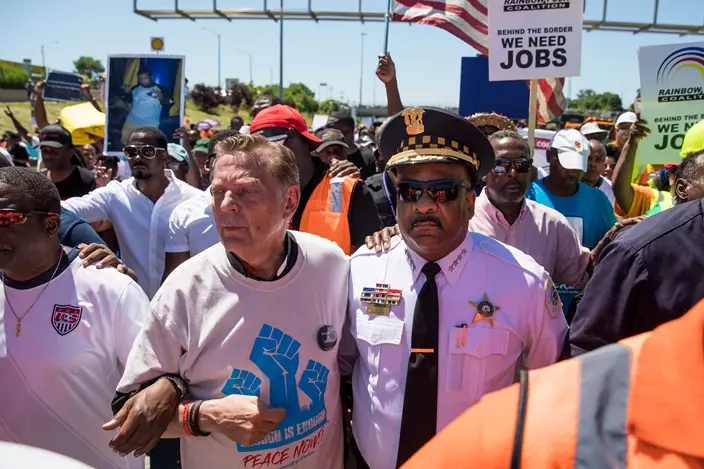
Rev. Michael Pfleger and Chicago Police Supt. Eddie Johnson march arm-in-arm alongside protesters who poured into the inbound lanes of Interstate 94 known as the Dan Ryan Expressway Saturday, July 7, 2018 in Chicago. The protesters shut down the interstate to draw attention to the city's gun violence and pressure public officials to do more to help neighborhoods hardest hit by it. (Ashlee Rezin /Chicago Sun-Times via AP) /Chicago Sun-Times via AP)
Illinois State Police, which has jurisdiction over expressways, announced around 11:30 a.m. that they were shutting down all northbound lanes of the expressway. Protesters then began walking northbound along the route.
Illinois Gov. Bruce Rauner took to Twitter to call the shutdown "unacceptable," saying there had been parameters set to allow protesters to march while "respecting law and order" but that protesters instead chose "chaos." The Republican also said he was "disappointed" in Chicago Mayor Rahm Emanuel.
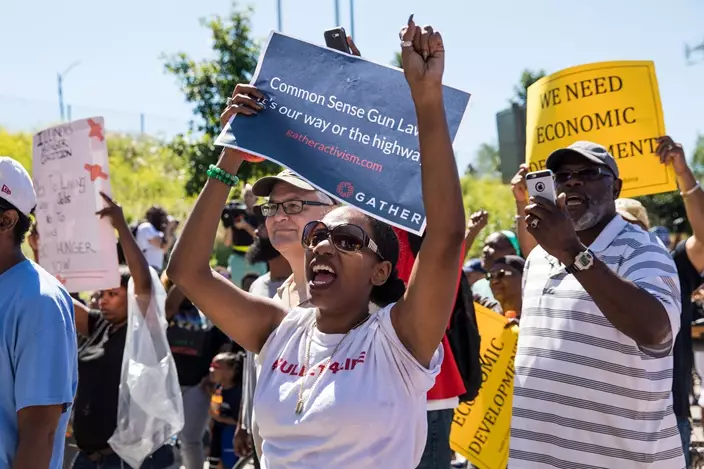
Thousands of anti-violence protesters pour into the inbound lanes of Interstate 94 known as the Dan Ryan Expressway Saturday, July 7, 2018 in Chicago. The protesters shut down the interstate to draw attention to the city's gun violence and pressure public officials to do more to help neighborhoods hardest hit by it. (Ashlee Rezin /Chicago Sun-Times via AP) /Chicago Sun-Times via AP)
"I am calling on the Mayor to take swift and decisive action to put an end to this kind of chaos," Rauner wrote.
Emanuel, a Democrat, responded in a tweet : "It was a peaceful protest. Delete your account."
Pfleger said the next step is accomplishing the actual goal — an "aggressive plan" to address the violence . Among the demands the protesters listed were more resources, jobs and better schools for their communities as well as stronger gun laws.
There's a historical significance to marching along the Dan Ryan Expressway — a roadway some believe was built in the early 1960s to separate white communities and poor, black ones. To the west of the new interstate were Comiskey Park, home of the White Sox, and neighborhoods such as Bridgeport, home to then-Mayor Richard J. Daley and his clan. To the east rose the Robert Taylor Homes, a high-rise public housing complex that became notorious for its violence.
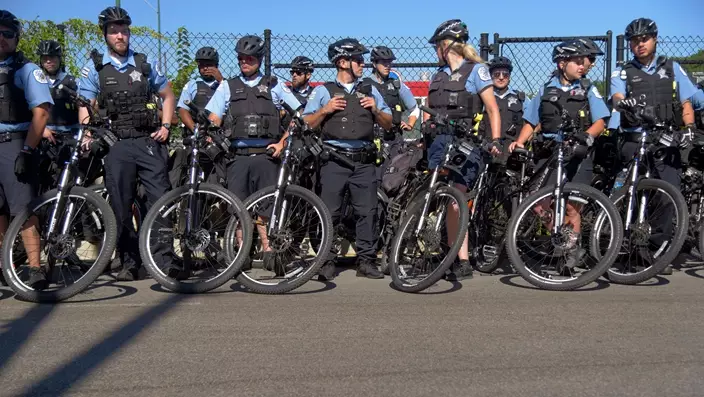
Chicago police officers stand before a protest on the Dan Ryan Expressway, Saturday, July 7, 2018, in Chicago. Thousands of protesters have shut down the interstate to draw attention to the city's gun violence and pressure public officials to do more to help neighborhoods hardest hit by it. (AP Photo/Annie Rice)
It was the kind of racial and economic segregation that still exists in Chicago today.
Chicago police said the city had 252 homicides and 1,100 shootings in the first six months of this year, a decrease from the same period last year. But those crimes have been heavily concentrated in predominantly black, low-income neighborhoods.
NEW YORK (AP) — Months before they pitched their tents on Columbia University's main lawn, inspiring a wave of protest encampments at college campuses nationwide, a small group of pro-Palestinian student activists met privately to sketch out the logistical details of a round-the-clock occupation.
In hours of planning sessions, they discussed communications strategies and their willingness to risk arrest, along with the more prosaic questions of bathroom access and trash removal. Then, after scouring online retailers and Craigslist for the most affordable options, they ordered the tents.
“There’s been a lot of work, a lot of meetings that went into it, and when we finally pulled it off, we had no idea how it would go,” said Columbia graduate student Elea Sun. “I don’t think anyone imagined it would take off like it did.”
Those involved with the Columbia protest, also known as the “Gaza Solidarity Encampment,” describe their organizing efforts as both meticulously planned and heavily improvised. They say the university’s heavy-handed attempts to quell the movement have only lent it more momentum.
Basil Rodriguez, a Columbia student affiliated with Students for Justice in Palestine, a group the university suspended in November, said organizers had been in touch with students at other schools about how to erect their own encampments. About 200 people joined one call with students on other campuses.
To attract the most news media attention, the organizers timed the Columbia encampment to coincide with university president Minouche Shafik's testimony last Wednesday to a congressional panel investigating concerns about antisemitism at elite colleges.
The following day, officers with the New York police department flooded the campus, dismantled the tents, arrested more than 100 activists, and threw out their food and water. Shafik said she had taken the “extraordinary step” of requesting police intervention because the encampment had disrupted campus life and created a “harassing and intimidating environment" for many students.
That decision fueled currents of rage that quickly washed across the country, prompting students at other college campuses to set up their own protest encampments.
“We’re standing here today because we’re inspired by the students at Columbia, who we consider to be the heart of the student movement,” Malak Afaneh, a law student and spokesperson for the 100-student-strong encampment at the University of California, Berkeley, said Tuesday.
Just hours after last week's arrests, some Columbia students jumped a fence to an adjacent lawn, wrapping themselves in blankets until a new provision of tents eventually arrived. In the week since police cleared the first encampment, the second iteration has grown not only larger, but more organized.
“The university thought they could call the police and make the protesters go away. Now we have twice as many protesters,” said Joseph Howley, an associate professor at Columbia and supporter of the encampment. “The students have experienced a ratcheting up of repression that has prompted them to escalate with their own tactics now.”
The mood was lively and upbeat on Wednesday, as some students passed out matzo leftover from a Passover seder and knafeh, a flaky Middle Eastern pastry dropped off by a supportive Palestinian family from New Jersey.
Others attended a teach-in delivered by a Columbia alumnus involved in the anti-apartheid movement in the 1980s, pulled books off the shelf of a “People’s Library,” and helped themselves to art supplies from a craft table. Those who’d spent the night in one of roughly 80 tents said they used the bathrooms at nearby university buildings. (An earlier experiment with a “camp toilet” had been quickly abandoned.)
At the nearby law library, a group of negotiators representing the protesters has been meeting intermittently with university administrators since Friday to discuss their demands, which include cutting financial ties with Israel and the companies involved in the war in Gaza, as well as amnesty for students and staff facing discipline for participating in the protests.
Those talks broke down on Tuesday night, according to the lead negotiator, Mahmoud Khalil, after he said the university threatened to send in police and the National Guard if the encampment wasn’t gone by midnight. Hundreds of students and faculty quickly packed onto the lawn in the largest numbers since the start of the demonstration.
Overnight, the university backtracked, giving demonstrators a 48-hour extension if the group agreed to block nonstudents from the encampment and remove a certain number of tents. A spokesperson later denied that the university had suggested calling the National Guard.
While there have been confrontations and allegations of antisemitic activity outside the university’s gates, police described students inside the encampment as peaceful and compliant.
Organizers said they’d dismantled a few tents for fire safety reasons, but were still admitting outsiders to the encampment as long as they abided by community guidelines, including: no photographs, littering or engaging with counter-protesters. They said they had no plans to leave until their demands were met.
Opponents of the encampment say it has destabilized campus life, forcing the university to barricade many of its entrances to nonstudents while putting Jewish students in harm’s way.
Omer Lubaton Granot, a graduate student from Israel who is studying for a master's degree in public administration at Columbia, said the university should have taken “more assertive action” in clearing the encampment. He accused protesters of embracing an aggressive anti-Zionist stance that made him feel unsafe.
“They’re canceling my identity and they’re threatening me as an Israeli and as a Jew,” he said.
Officials including President Joe Biden and Democratic New York Gov. Kathy Hochul have also condemned what they described as antisemitism associated with the protests. On Wednesday, Republican House Speaker Mike Johnson held a news conference at Columbia to denounce the encampment, drawing jeers from many students.
Mayor Eric Adams, a Democrat, noted this week that many of the students were sleeping in the same brand of tents, which he said could indicate that “outside agitators” were responsible for arranging the encampment, a baseless claim that had earlier spread among some right-leaning news media outlets and New York police officials.
Layla Saliba, a Palestinian American student at Barnard, Columbia's sister college that shares some facilities with the university, dismissed the idea. She said the students leading the protest were mostly “nerds” who enjoyed lengthy meetings and consensus building.
“To imply this is AstroTurfed or paid off, when it has actually been students laying the groundwork for this from the very beginning, is ridiculous,” she said.
As for the similarity of the tents, she said the brand had been ordered in bulk by student organizers. As the encampment has expanded, students have brought their own camping gear, she said, pointing to the varied sleeping arrangements on the bustling lawn.
“There’s apparently a lot of people here at Columbia who like to camp,” she added. “I’ll admit I was a bit surprised by that.”
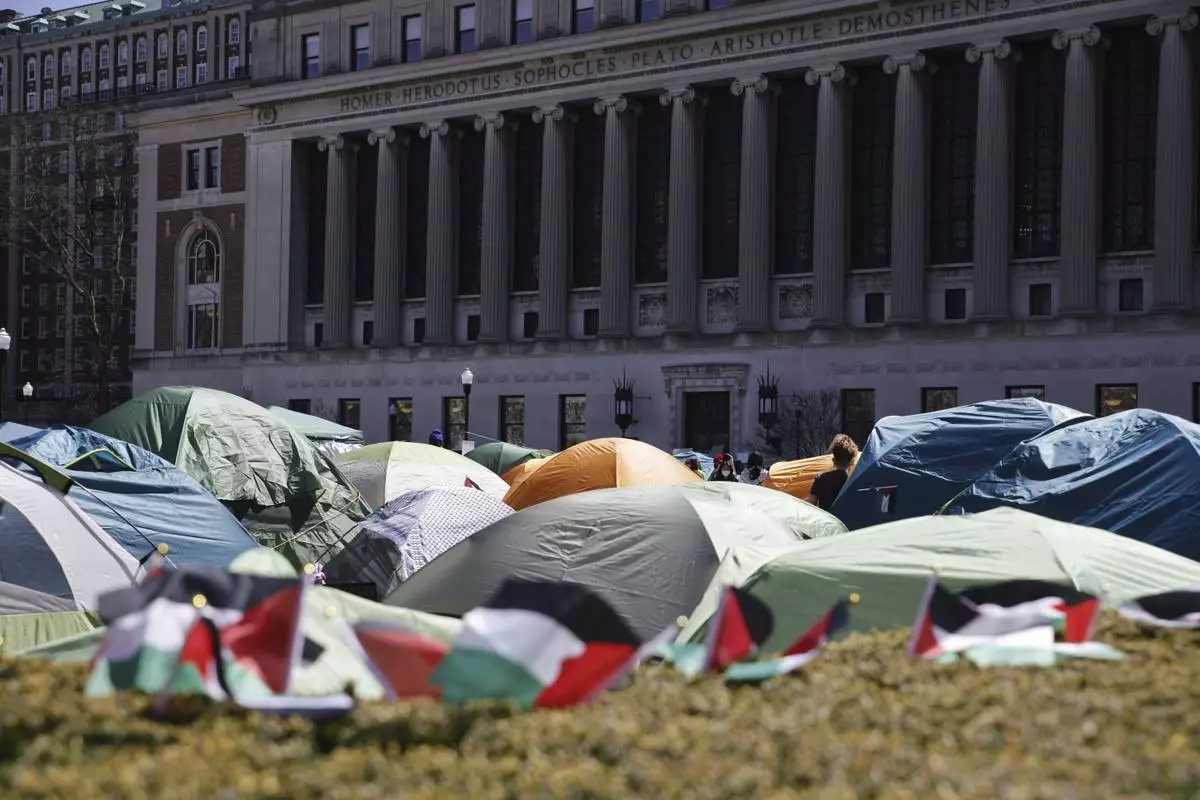
Tents are erected at a pro-Palestinian demonstration encampment at Columbia University in New York, Monday April 22, 2024. (AP Photo/Stefan Jeremiah)
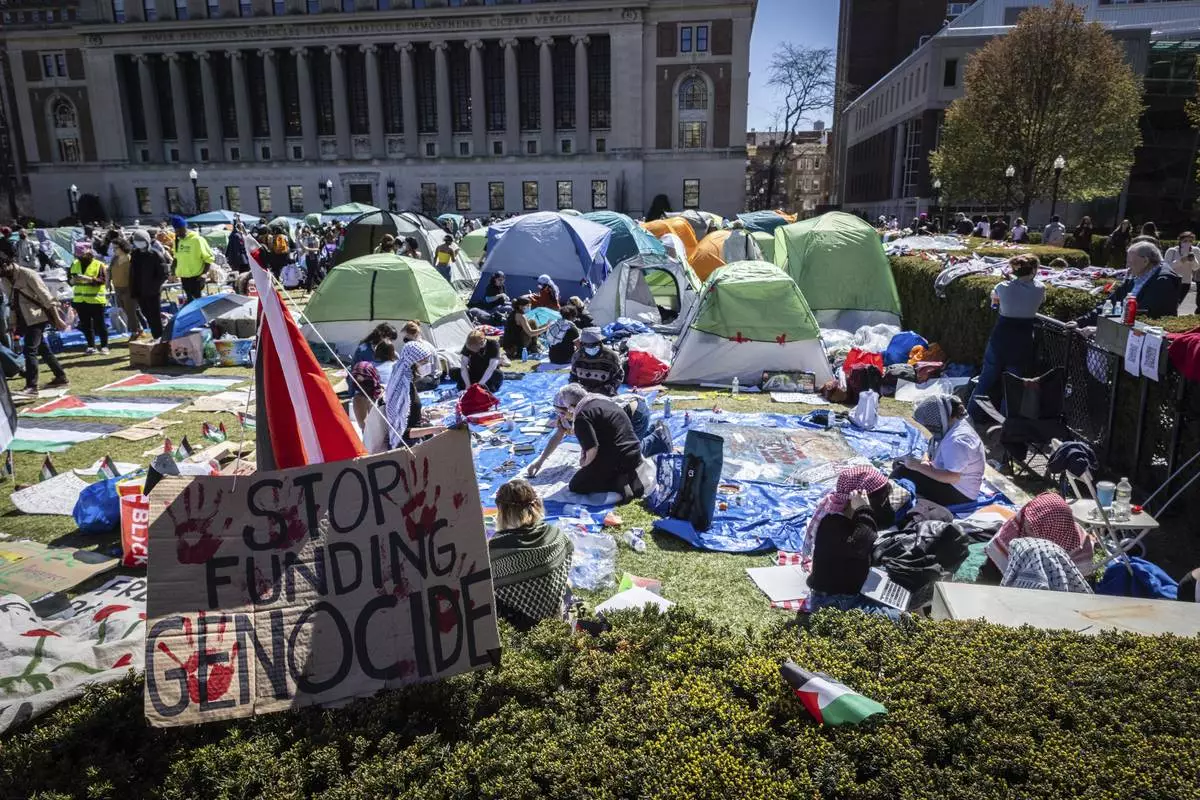
A sign sits erected at the pro-Palestinian demonstration encampment at Columbia University in New York, Monday, April 22, 2024. (AP Photo/Stefan Jeremiah)
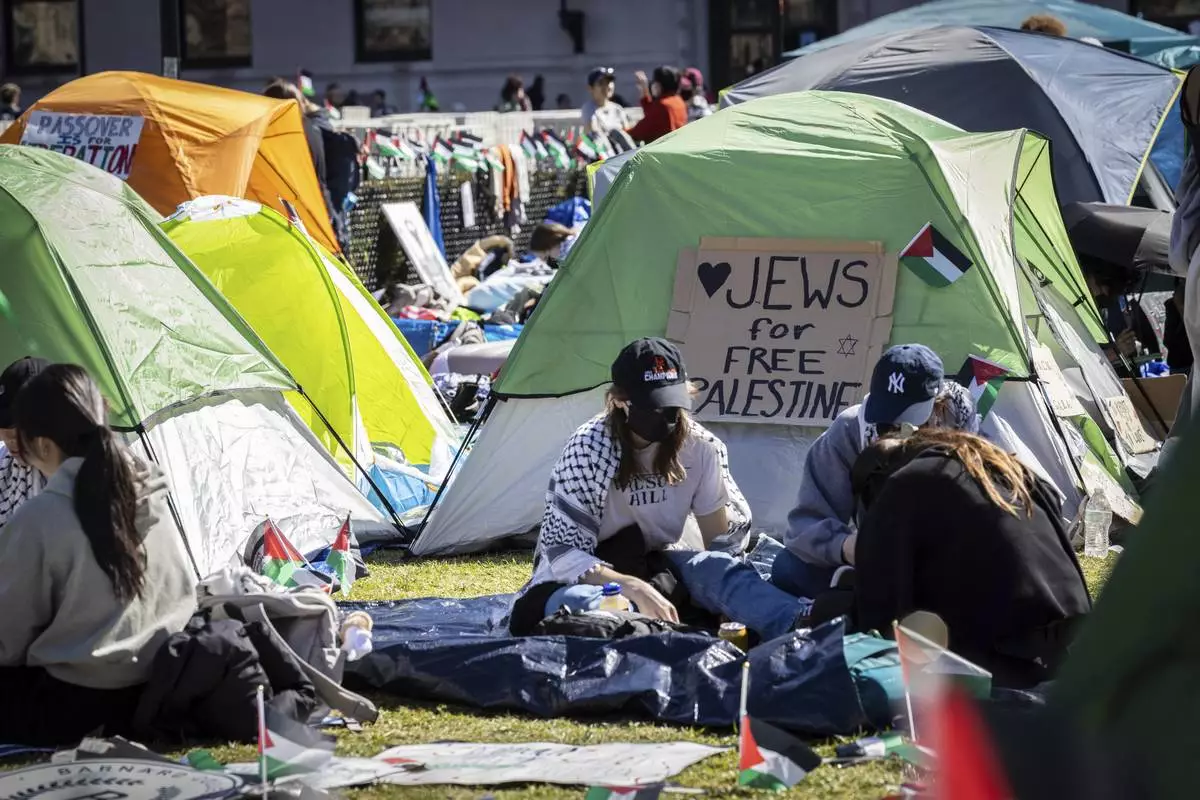
Student protesters sit in front of a tent during the Pro-Palestinian protest at the Columbia University campus in New York, Monday April 22, 2024. (AP Photo/Stefan Jeremiah)
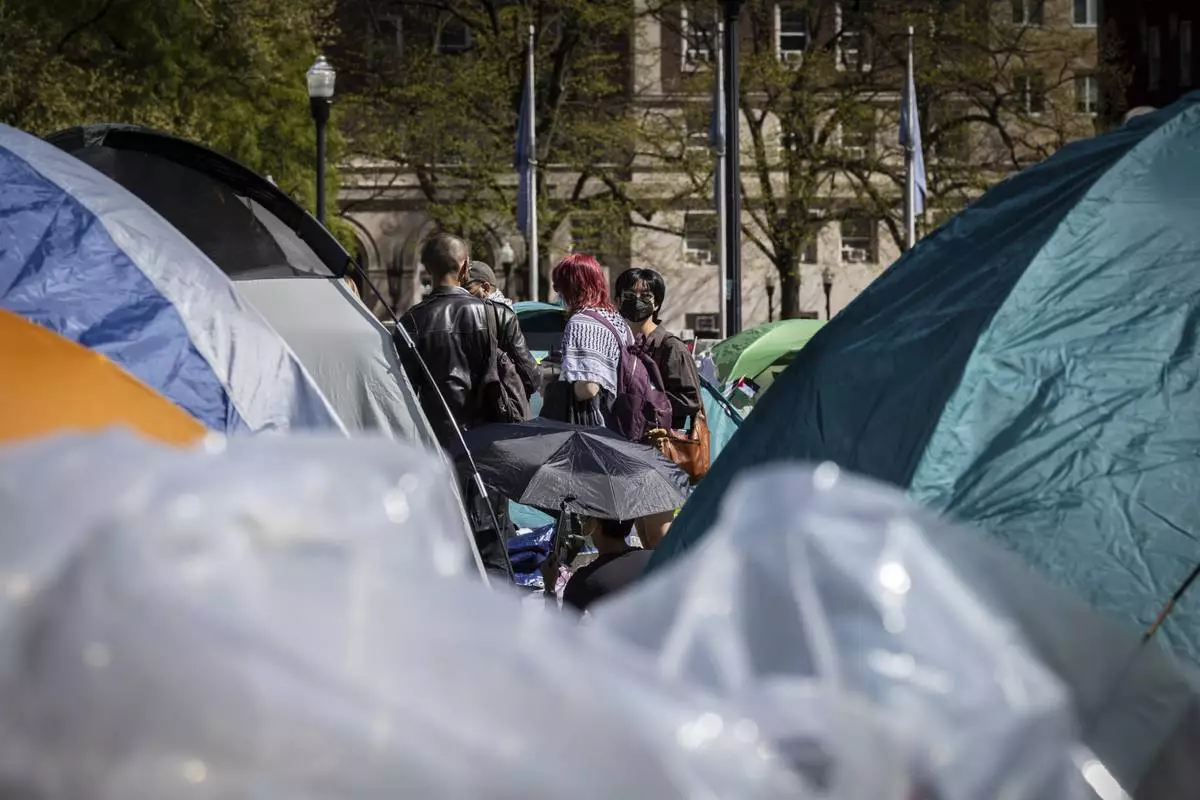
A student protester sits among the tents erected at the Pro-Palestinians protest at the Columbia University campus in New York on Monday April 22, 2024. (AP Photo/Stefan Jeremiah)
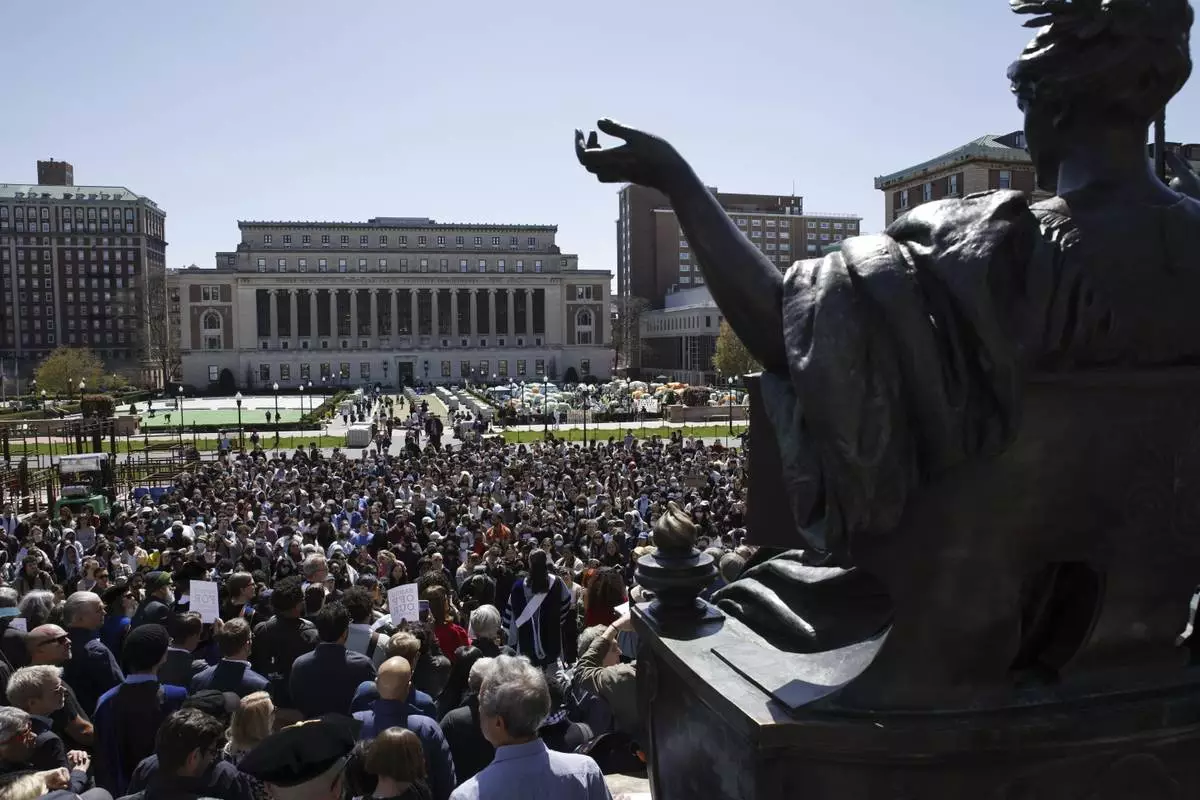
Columbia University professors speak in solidarity with their students rights to protest free from arrest at the Columbia University campus in New York on Monday April 22, 2024. (AP Photo/Stefan Jeremiah)
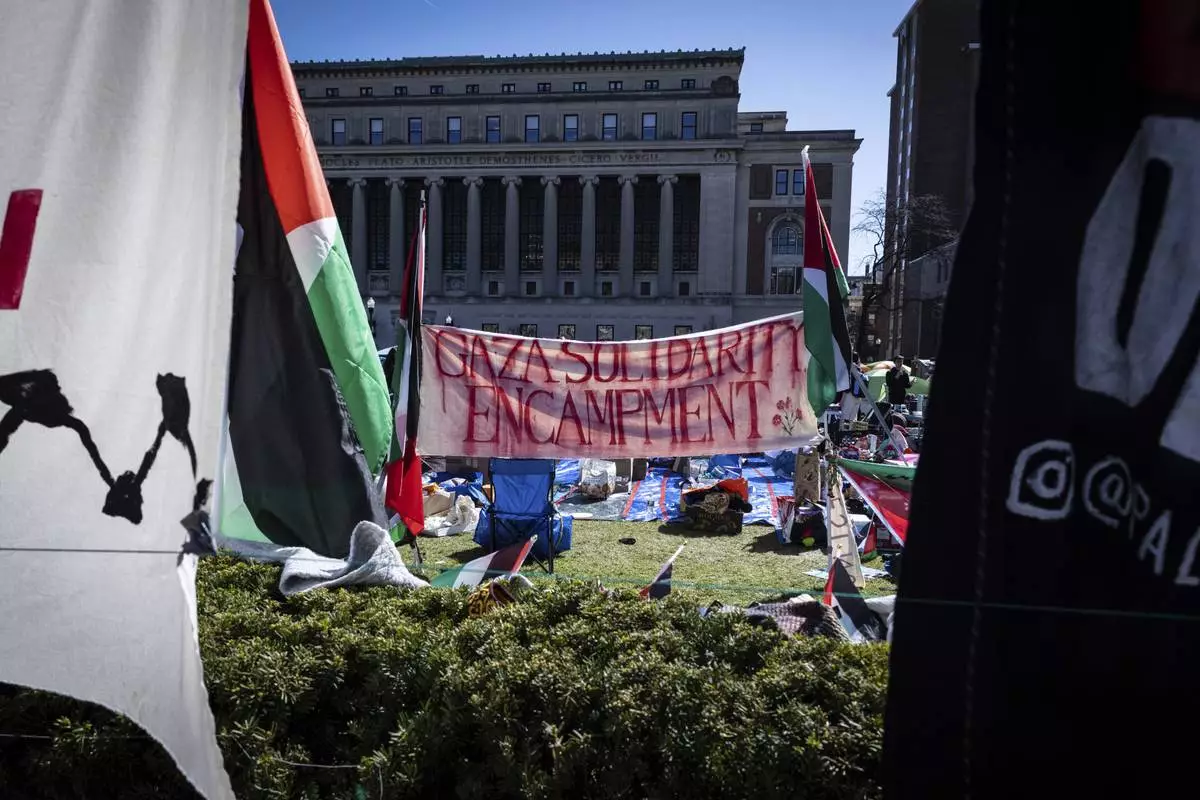
A sign that reads, Gaza Solidarity Encampment, is seen during the Pro-Palestinians protest at the Columbia University campus in New York, Monday April 22, 2024. (AP Photo/Stefan Jeremiah)














